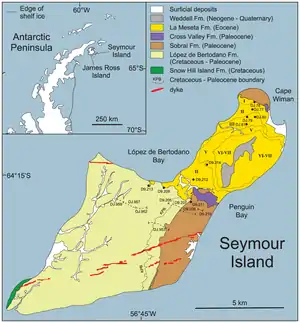Sobral Formation
The Sobral Formation is a palaeontological formation located in Antarctica. It dates to the Danian stage of the Lower Paleocene period.[1]
| Sobral Formation Stratigraphic range: Danian ~66–61.6 Ma | |
|---|---|
| Type | Geological formation |
| Unit of | Marambio Group |
| Underlies | Cross Valley & La Meseta Formations |
| Overlies | Lopez de Bertodano Formation |
| Thickness | 250 m (820 ft) |
| Lithology | |
| Primary | Siltstone, mudstone |
| Other | Concretion, sandstone |
| Location | |
| Coordinates | 64.3°S 56.7°W |
| Approximate paleocoordinates | 63.2°S 66.6°W |
| Region | Seymour Island, James Ross Island group |
| Country | Antarctica |
 Geologic map of Seymour Island, Antarctica with the Sobral Formation in brown | |
Spectacular fossils documenting marine and terrestrial ecosystems soon after the (non-avian) dinosaurs became extinct at the Cretaceous-Paleogene boundary are found in this formation.[2] One of the most significant sites is on Seymour Island.
References
- Bowman, V.; Ineson, J.; Riding, J.; Crame, J.; Francis, J.; Condon, D.; Whittle, R.; Ferraccioli, F. (2016). "The Paleocene of Antarctica: Dinoflagellate cyst biostratigraphy, chronostratigraphy and implications for the palaeo-Pacific margin of Gondwana". Gondwana Research. 38: 132–148. doi:10.1016/j.gr.2015.10.018.
- Crame, J.A.; Beu, A.G.; Ineson J.R.; Francis J.A.; Whittle R.J.; Bowman V.C. (2014). "The Early Origin of the Antarctic Marine Fauna and Its Evolutionary Implications". PLOS ONE. 7 (12): e114743. doi:10.1371/journal.pone.0114743. PMC 4262473. PMID 25493546.
Further reading
- Baldoni M. A., Barreda V. D. (1986). "Estudio palinológico de las formaciones López de Bertodano y Sobral, Isla Vicecomodoro Marambio, Antártida". Boletín del IG-USP, Serie Científica (17): 89–98.
- Filkorn H. F. (1994). "Fossil scleractinian corals from James Ross Basin, Antarctica". Antarctic Research Series. 65: 1–96.
- Poole I., Mennega A. M. W., Cantrill D. J. (2003). "Valdivian ecosystems in the Late Cretaceous and Early Tertiary of Antarctica: further evidence from myrtaceous and eucryphiaceous fossil wood" (PDF). Review of Palaeobotany and Palynology. 124: 9–27. doi:10.1016/s0034-6667(02)00244-0.CS1 maint: multiple names: authors list (link)
This article is issued from Wikipedia. The text is licensed under Creative Commons - Attribution - Sharealike. Additional terms may apply for the media files.
